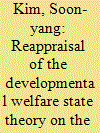|
|
|
Sort Order |
|
|
|
Items / Page
|
|
|
|
|
|
|
| Srl | Item |
| 1 |
ID:
131564


|
|
|
|
|
| Publication |
2014.
|
| Summary/Abstract |
This article reads Bashar al-Asad's rule through the prism of social activism and, in particular, through the field of charities. The sociopolitical transformations Syria experienced between 2000 and 2010-the shift in state-society relations, the opening of the civic arena, and economic liberalization-are explored through the activities of charitable associations, including their interactions with other Syrian actors, and we argue that they reflect the unraveling of the old social contract. The Syrian leadership outsourced important state welfare functions to charities while also creating nongovernmental organizations (NGOs) under its own control and supporting developmental NGOs loyal to the regime. These NGOs differed from the existing charities in terms of their social base, financial backgrounds, motivations, modes of institutionalization, and public relations strategies, and enabled the authoritarian regime to pursue a new strategy of divide-and-rule politics. At the same time, subcontracting poor-relief measures to charities eroded the regime's political legitimacy and helped sow the seeds of the 2011 uprising.
|
|
|
|
|
|
|
|
|
|
|
|
|
|
|
|
| 2 |
ID:
172351


|
|
|
|
|
| Summary/Abstract |
The purpose of this article is to re-examine the perspective on the relationship between East Asia’s growth economy and its underdevelopment of state welfare, by analyzing the Korean case between the 1960s and the 1980s, when active governmental intervention in the economy led to rapid economic growth. This article aims to answer the questions ‘Was state welfare genuinely underdeveloped under the growth economy of East Asia?’ and ‘If so, which factors hindered its development?’ To this end, this article first refutes the perspective regarding the underdevelopment of state welfare in East Asian growth economies, through an empirical analysis of the following: overlooking diverse indices in measuring the level of state welfare, a comparison without considering different budget systems, negligence of output aspects, giving undue value to quantitative methods and paying little attention to welfare beneficiary aspect. The article traces the reasons why the growth economy experienced the underdevelopment of state welfare using comprehensive frameworks: large-scale resource distribution to defense and education, low level of electoral competition, underdevelopment of socialist political parties, political authoritarianism and weak opposition, lack of social citizenship and preservation of family values, underdevelopment of trade unionism, and inactivation of civil society.
|
|
|
|
|
|
|
|
|
|
|
|
|
|
|
|
|
|
|
|
|